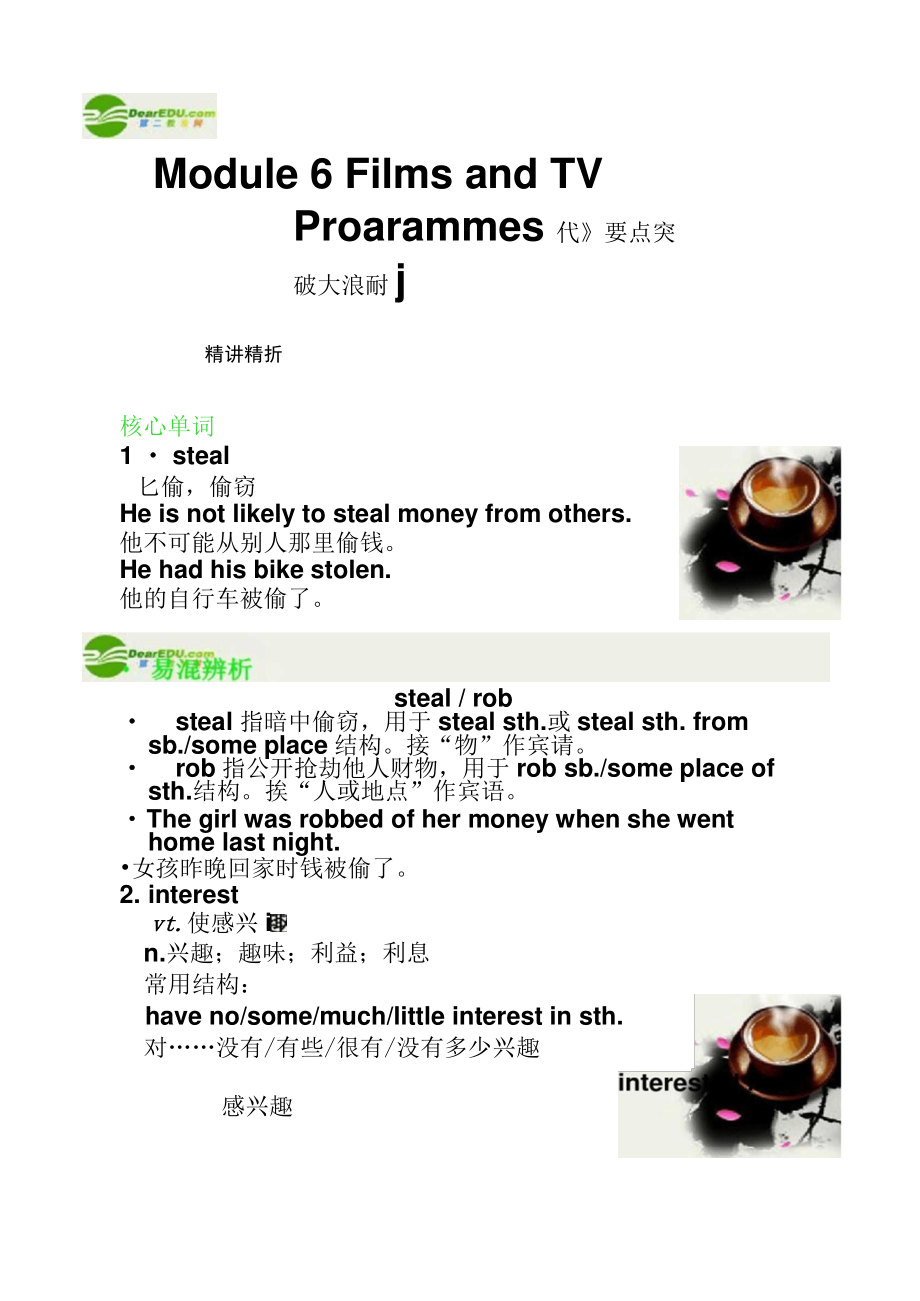《2011屆高考英語總復(fù)習(xí)《學(xué)案與測評(píng)》Module6(精)》由會(huì)員分享���,可在線閱讀���,更多相關(guān)《2011屆高考英語總復(fù)習(xí)《學(xué)案與測評(píng)》Module6(精)(8頁珍藏版)》請?jiān)谘b配圖網(wǎng)上搜索。
1���、 Module 6 Films and TV Proarammes 代要點(diǎn)突破大浪耐j 精講精折 核心單詞 1 steal 匕偷���,偷竊 He is not likely to steal money from others. 他不可能從別人那里偷錢。 He had his bike stolen. 他的自行車被偷了���。 steal 指暗中偷竊���,用于steal sth.或steal sth. from sb./some place結(jié)構(gòu)。接“物”作賓請���。 rob指公開搶劫他人財(cái)物���,用于rob sb./some place of sth.結(jié)構(gòu)。挨“人或地點(diǎn)”作賓語���。 The girl was robb
2���、ed of her money when she went home last night. 女孩昨晚回家時(shí)錢被偷了���。 2. interest n.興趣;趣味���;利益���;利息 常用結(jié)構(gòu): have no/some/much/little interest in sth. 對沒有/有些/很有/沒有多少興趣 感興趣steal / rob vt.vt.使感興i a place of interest 名勝 in the interest of 為了 Chemistry interests him a lot.他對化學(xué)很感興趣。 I borrow the money at 5% interest. 我以五
3���、分利息借了那筆錢���。 I have lost interest in physics. 我對物理已經(jīng)失去了興趣。 聯(lián)想拓展 interested adj.adj.感興趣的 interesting adj.adj.有趣味的���,令人感興 3. express 譏表達(dá);表示���;ac(/快速的;特快的 常用結(jié)構(gòu): express ones thanks to sb.向某人表示感謝 express way 高速公路 HE DU com If you take an express train, it will take you two hours to get there 如果你乘特快列車,兩個(gè)小時(shí)就可到達(dá)那
4���、里���。 I cant express to you how grateful I am for your help. 你對我的幫助,我感激不盡���。 聯(lián)想拓展 expression門表達(dá)���;表現(xiàn);表情 beyond expression無法形容;無法表達(dá) 4. occasionally adv.adv.偶爾���, 有時(shí)* (=now and then/every now and then) They occasionally saw him walking along the river bank. 他們偶爾看到他沿河邊行走���。 We go for walks in the fields occasiona
5、lly. 我們偶爾去田間散步���。的利益 :DareDU.com p 二. 聯(lián)想拓展 occasion n.時(shí)機(jī);場合 on occasion(s)=occasionally 偶爾���,有時(shí) on one occasion 有一次 on special occasions在特殊的場合 In a sports team, each player has a clear role, and there are few occasions where members are confused or uncertain of their roles 5 argue 匕爭辯;爭論���;主張���;認(rèn)為 常用結(jié)構(gòu): arg
6���、ue with sb. about sth.因某事與某人爭論 argue for / against sth.支持/反對某事 ZDMrCDU.com argue that認(rèn)為 . argue sb. into/out of doing sth.說服某人做/不做某事 We shall argue with them about the question 就這個(gè)問題,我們將和他們爭論一番���。 He argued for the five-day work system 他贊成五天工作制���。 She argued that our attempt would be a waste of time. 她認(rèn)
7、為我們的嘗試將會(huì)白白地浪費(fèi)時(shí)間���。 重點(diǎn)短語 6. to ones surprise=to the surprise of sb. 令某人驚訝的是 注意:此結(jié)構(gòu)中需特別關(guān)注ones后需用名詞���。豁明確的角色���,幾乎沒有不明 在 聯(lián)想拓展 to ones joy/astonishment/satisfaction/horror/ relief/sorrow/delight 使某人高興/吃驚/滿意/恐怖/寬慰/傷心/高興的 是 關(guān)注下面兩句的相互轉(zhuǎn)換: To my surprise, little Tom should take the lead in this competition. What su
8���、rprises me is that little Tom should take the lead in this competition. 使我吃驚的是小湯姆竟然在競賽中得了一等獎(jiǎng)。 WJ.C 7. come out 出來���;出版���;發(fā)行���;沖洗出來;真相顯露 The rain stopped and the sun came out. 雨停了���,太陽出來了。 It came out that he d been telling lies. 后來才知道他一直在說謊���。 易混辨析 come out/publish come out出版���,為不及物動(dòng)詞短語,不能用于被動(dòng)語態(tài)���。 publish出版���,為及物動(dòng)
9、詞���,可用于被動(dòng)語態(tài)���。 When will your book come out? =When will your book be published? 你的書什么時(shí)候?qū)绨妫?8. care about 喜歡���;想;關(guān)心���;在乎���;介意 I dont care much about going to the party. 我不太想去參加晚會(huì)。 You say you care about the poor, but you dont help them, why? 你說你關(guān)心窮人���,可你并不幫助他們���,為什么? Little does he care about money.他不太在乎錢���。 易混辨析 ca
10���、re about/care for 意為喜歡;想���;愿意”時(shí)兩者相似���,但care about強(qiáng) 調(diào)感興趣���,而care for表示愛好,也可表示喜歡某個(gè)人 意為“介意,在乎”時(shí)���,只用care abo叫特別是 跟doing Bt,不用care for;而care for可以鳶為 照顧,相當(dāng)Tlook after, take care of,逡滬* care abouto DMHEDU.oam Do you care about modern music? 你對現(xiàn)代音樂感興趣嗎���? No, I prefer classical music to modern music. 不,我更喜歡古典音樂���。 .fa
11、ll in love with sb./be in love with sb. 愛上某人/與某人相愛 易混辨析 fall in love with sb./be in love with sb. fall in love with sb.為短暫性動(dòng)詞短語���, 不能與for引導(dǎo) 的時(shí)間狀語連用���。 be in love with sb為延續(xù)性動(dòng)詞短語, 可與for引導(dǎo)的 時(shí)間狀語連用���。 JDU.u I fell in love with her at first sight.我對她一見鐘情���。 They have been in love with each other for 5 years 他們相
12、愛有5年了。 重點(diǎn)句型 10. But it is generally agreed, that he, more than anyone else in the history of films, understands the meaning of the word “entertainment. 但是人們普遍認(rèn)為他對“娛樂”這個(gè)詞的理解勝過電影史 上的其他人���。 It is agreed that =People agree that 人們認(rèn)為/贊同It is+believed /thought that 人彳門認(rèn)為 known that.眾所周知 . reported that 據(jù)報(bào)道
13���、. supposed that大家推測 . considered that.人彳門認(rèn)為 . suggested that.人們建議 . required/demanded that 據(jù)要求 estimated that.據(jù)統(tǒng)計(jì) . said that.據(jù)說 . It is thought that the project cant be completed this year. 大家認(rèn)為這個(gè)工程今年不可能竣工了。聯(lián)想拓展 tW.c As is known to all, Zhang Yimou is a very famous director. 眾所周知���,張藝謀是一位非常有名的導(dǎo)演���。 It
14、is said that they have got to the town. 據(jù)說���,他們已經(jīng)到了那個(gè)城鎮(zhèn)���。 11. Brave, good and strong, Xiulian is the character we care about most. 我們最關(guān)注秀蓮這個(gè)角色,她勇敢���、善良���、堅(jiān)強(qiáng)。 Brave, good and strong在句中作原因狀語���, 相當(dāng)于 because she was brave, good and strong o Tired and bored, he lay there, saying nothing. 因?yàn)橛掷塾譄?��,他躺在那里啥也不說���。 Afraid
15、of being criticized, he didnt go to the teache office. 因?yàn)楹ε率芘u(píng)���,他沒到老師的辦公室去���。 D i利用構(gòu)詞法知識(shí)填空 1 People in China are now _ a colourful _ and most of them are healthy all the time.(live) 2. Last night Tom _ a _ that he won the game, but it isnt(dream) 3 That sound _ / _ terrible(sound) 4. At the first sight
16、 of me, he _ a big _ to me (smile) 答案: 1. living; life 2. dreamed; dream 3. sounded; sounds 4. smiled; smile b fore-no 綴 1.(指時(shí)間或職位)前, 預(yù)先 2.(指位置)在前部 原形 tell see warn arm cast father finger head foot man arm leg word going 合成詞 foretell預(yù)書���,預(yù)示 foresee預(yù)見,預(yù)料 forewarn預(yù)先警告 forear m預(yù)先武裝 castforecast預(yù)報(bào)���, 預(yù)測J forefather 祖先 forefinger 食指 forehead 訶額 forefoot 前腳 foreman 匸頭 forearm 詢臂
 2011屆高考英語總復(fù)習(xí)《學(xué)案與測評(píng)》Module6(精)
2011屆高考英語總復(fù)習(xí)《學(xué)案與測評(píng)》Module6(精)

